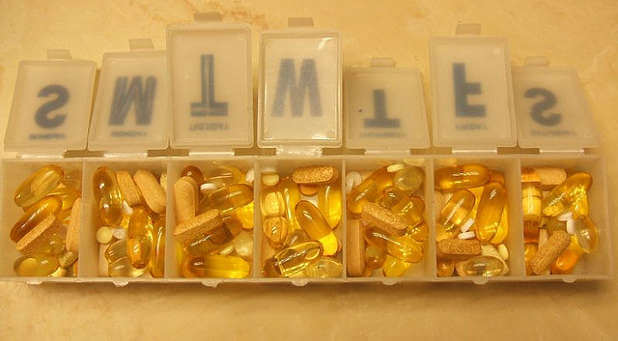When Dr. Moyad was 22, he researched, wrote and published his first medical paper on the effects of cottonseed oil on health. Shortly thereafter, he was one of the primary investigators of the L-tryptophan dietary supplement debacle in Florida where a huge batch of tainted supplements caused at least 37 deaths and 1,500 permanent disabilities.
As he interviewed patients, Dr. Moyad determined it was a problem with the manufacturer and impurities produced at the plant got into the supplements. In the process of working on the medical paper, Dr. Moyad spent years doing extensive research on supplements.
After his cousin died from breast cancer at the age of 38, Dr. Moyad went on a speaking tour to encourage people to contact their representative in Washington, D.C., to increase funding for cancer research. During this tour, cancer patients approached Dr. Moyad about their diets and supplements. He answered all of their questions and ended his trip by gathering signatures to Senators at the Capitol. After that, Dr. Moyad decided to make a career out of specializing in dietary supplements.
After he set up a consulting practice at the University of Michigan Medical Center in the department of urology, he began conducting research on diet and supplement-related research on many types of cancers. One day, Dr. Moyad was consulting with a patient named Phil Jenkins. Phil had cancer and Dr. Moyad gave him diet and supplement advice for his condition.
Phil asked why no doctors were working full-time in this area. Dr. Moyad said that the medical system was not set up to educate or train doctors in this category. Dr. Moyad jokingly said, “If you contributed $1.5 million to a supplement endowment, then I could devote my life to studying dietary supplements and wouldn’t have to charge people for my advice.” A few days later, Phil wrote a check for $1.5 million.
Now, more than 20 years later, Dr. Moyad says the endowment has grown substantially because of other donors. Today, Dr. Moyad spends real time with patients, often in the comfort of their own homes, in addition to teaching, conducting research, lecturing to various groups and consulting with supplement and pharmaceutical companies to help them do a better job.
“Some people have said that I may be the top expert in the world right now in this area,” says Dr. Moyad. “But I would argue that I am just a trailblazer, clearing the way for other doctors and health care professionals to specialize in this growing field.”
Navigating the Supplement World
Dr. Moyad believes the days of dabbling in the world of supplements are over. There is a myriad of information and much of it is confusing.
“If a so-called ‘expert’ is only dabbling part-time in this area but dishing out information to you, he is being reckless, especially since so many supplements are the equivalent of drugs,” says Dr. Moyad. Many prescription drugs are derived from natural sources.
Cholesterol-lowering statins originally came from a fungus/yeast; metformin, used in diabetes, originates from the French lilac; and aspirin was created from willow bark. If a drug is more effective in treating an ailment than a supplement, Dr. Moyad has no problem saying so.
Dr. Moyad is not a pill-pusher.
“I am a healthy-lifestyle advocate,” he says. He believes that lifestyle plays a huge role in being healthy.
“Obesity has overtaken smoking as the primary preventable cause of illness and premature death,” says Dr. Moyad. “Obesity is increasing diseases in every category. People don’t realize that part of the solution is in them.”
For example, we can reduce the chances of getting male/female aggressive forms of cancers by exercising and losing weight. “The biggest killer of testosterone is weight gain,” says Dr. Moyad.
There is no need for taking supplements for low testosterone. He says there are serious breakthroughs in medical dietary studies of Vitamin E and Alzheimer’s.
“Two thousand IU slows nerve damage in patients,” says Dr. Moyad. “It reduced caregiver time by two hours a day.” Vitamin E was used along with medication in the studies. “It’s not a cure but we have something positive and we don’t get many things positive for Alzheimer’s.”
Recent interest in the use of coconut oil to prevent Alzheimer’s is due to the MCT or medium chain trigycerides found in coconut oil that the body and brain use for fuel.
“Coconut oil is high in lauric acid which may be beneficial,” says Dr. Moyad. “The catch is that these fats may raise bad cholesterol in humans but at the same time we know they also raise good cholesterol, which is unique. I am excited about coconut oil, or the fats in them, because the brain is loaded with fat, especially at birth.”
Coconut oil is great for people who watch their health, but Dr. Moyad says there are no credible clinical trials as of now.














































